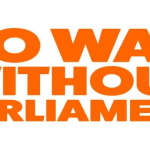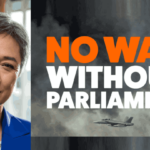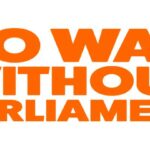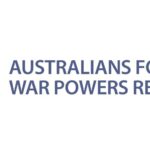Albanese Involves Australia in Yet Another Military Attack on a Foreign Nation
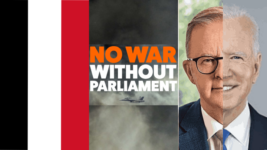
The US and the UK launched 73 airstrikes against Houthis forces in Yemen early last Friday, in an attempt to stop the militia continuing attacks upon commercial ships in the Red Sea. And as the US military outlines, 60 targets were hit in 28 locations in Yemen, with more than 150 munitions fired.
The Houthis have been attacking ships since the second week of the now 100-day wholesale massacre the Israeli government has been perpetrating upon the 2.3 million Palestinians living within the walled-in region of the Gaza Strip.
The militia that controls most of Yemen has been clear that its operations have been in solidarity with Palestine, as they specifically target ships linked to Israel. And Tel Aviv has so far slaughtered 23,000 civilian Palestinians, including over 10,000 children. And there’s still no plan for a ceasefire.
Defence minister Richard Marles said on Friday that this country had been involved in the US-UK airstrikes, and “this action was supported by four other nations: Canada, Bahrain, the Netherlands and Australia”, while he added our support involved “personnel in the operational headquarters”.
And as Australians for War Powers Reform (AWPR) points out, whilst no overt statements in this regard are being made, participation in this military operation against the Houthis and in aid of Israel does mark our involvement in a conflict in the Middle East and as usual, no one asked the people.
Genocide Joe fills us in
“Being involved in a coalition to protect shipping in the Red Sea is one thing, but involving Australia in direct missile attacks on the Houthis is quite another,” said AWPR spokesperson Dr Alison Broinowski on Saturday.
“Australia is now engaged in yet another war in the Middle East and neither the public nor the parliament have been given a say,” she added.
“Instead, we have the outrageous situation of Australians hearing about their country’s involvement in this via the president of the USA.”
Washington called on Canberra to send a warship to the Red Sea in December to aid in deterring further Houthis attacks on Israeli-linked shipping vessels. And while our nation declined and instead sent eleven personnel to assist in a 20 nation coalition known as Operation Prosperity Guardian.
As Broinowski further elaborated, US president Joe Bide, first announced Australia having provided support to the operation prior to our government having acknowledged this. Indeed, PM Anthony Albanese didn’t tweet his joint statement regarding participation until 4.38 pm on Friday afternoon.
Although, the PM had issued a 3 January joint statement regarding the situation in the Red Sea, which placed us in a coalition of fourteen nations warning the Houthis to stop. Yet, this number dropped down to six nations now engaging in the conflict, with Australia among them.
Coalition of the ignorant
AWPR has been petitioning the federal government for the process in which the nation decides on whether to engage in a foreign conflict, just like its participation in airstrikes against another country, as right now it is up to the prime minister and a select few ministers to make the call.
The process on deciding to enter a foreign conflict, or exercise war powers, has long been controversial as it doesn’t involve parliament and hence, the people. And federal Labor recently held an inquiry into making this a whole-of-parliament decision, yet it went on to ensure its failure.
AWPR asserts that this antiquated policy, founded in centuries-old British royal practice, should be replaced by a parliamentary debate on whether the nation enter foreign conflicts, just as the US decision engages congress. However, Biden did bypass congress on deciding to strike the Houthis.
As former Department of Foreign Affairs and Trade (DFTA) employee Dr Broinowski outlined, despite no official announcement regarding our engagement, Australia has “recklessly” taken part in a new conflict in the Middle East, without convening the war cabinet or advising parliament or the nation.
The UN Security Council passed a resolution on 10 January, condemning Houthis attacks on ships in the Red Sea. Yet, AWPR makes clear that the actions of two members of the council, the US and UK, in attacking Yemen just days later was illegal, as the determination didn’t sanction use of force.
Parliamentary debate warranted
The campaign to see war powers become a parliamentary decision has grown more urgent over recent years, due to the establishment of the AUKUS pact and mounting developments pointing to our nation following Washington into a war against our greatest trading partner China.
Yet, the war powers inquiry released its report last March and recommended no changes, which wasn’t entirely unexpected, as Marles wrote to it just after establishment advising against reform, and foreign minister Penny Wong further confirmed no change in parliament prior to its release.
“This means that MPs and senators will continue to have no right to vote on a war decision before troops are sent overseas,” Dr Broinowski told Sydney Criminal Lawyers after the report was released. And she added that it had left the nation in a similar position to the build up to war with Iraq.
The government did, however, determine, in line with an inquiry recommendation, that following the PM and war cabinet having decided to enter a foreign conflict, parliament will be convened to debate the matter and provide a statement of compatibility with international law.
And Australians for War Powers Reform is asking why this process isn’t taking place right now, as in participating in the US-UK strikes on Houthis locations in Yemen, the government has engaged us in an international military conflict, regardless of how small that participation may be.
Not only has AWPR called out nonadherence to the UN Security Council resolution passed last week, but this decision also places our nation on the side of Israel in its so-called war on the Palestinians of Gaza, at the exact same moment that the World Court is deciding on whether it is genocide.
“Numerous military experts have suggested that these attacks on Yemen could dramatically escalate the already dire situation in the region,” AWPR further warned last week.
“The Australian government has recklessly joined this conflict and has done so with almost no proper accountability or transparency.”



